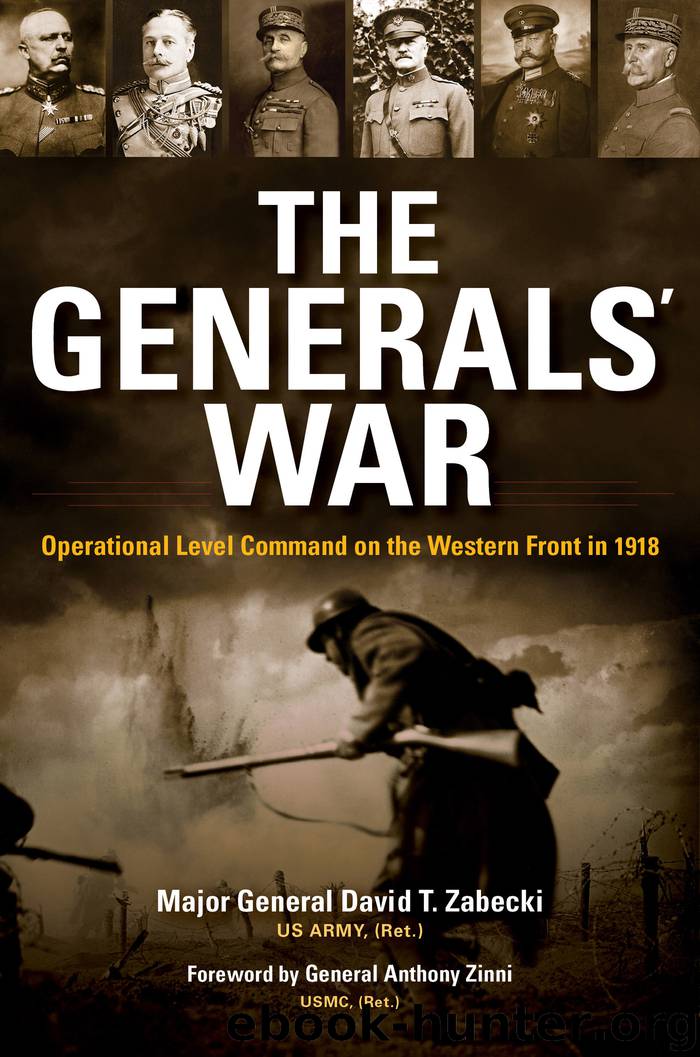The Generals' War by David T. Zabecki

Author:David T. Zabecki
Language: eng
Format: epub
Publisher: Indiana University Press
Published: 2018-03-14T16:00:00+00:00
FOCH VERSUS LUDENDORFF
As historian Tim Travers has noted, the Allies certainly did not win the battles of the German spring offensives campaign, but neither did they lose. By the morning of 18 July they had not lost sufficient ground, men, or matériel to bring them to the point of collapse, as Ludendorff believed. According to Travers, “By not losing, and by staying in existence, rather like the RAF in the Battle of Britain, the BEF and the French Army essentially took the initiative away from the German Army.”125
Despite his tendency to meddle in tactical details and his reluctance to abandon the old prewar tactical principles, almost all the operational decisions Foch made throughout the campaign were the correct ones. Without Foch’s direct intervention, Pétain’s innate pessimism and inclination to delay or possibly even cancel Mangin’s counterattack almost certainly would have led to different results in the Marne salient. Strategically, the Germans no longer had any hope of achieving a military victory, but if they had emerged from the July fighting in a somewhat better position, the war could have drug on much longer than it did.
Haig, too, when he insisted on the return of his four divisions just as the French were getting ready to launch the counterattack, failed to recognize the changed strategic situation. The strategic opportunity that was there for the Allies to grasp was far clearer to Foch than it was to either Haig or Pétain.126 As historian Robert Doughty wrote, “At a time when the situation called for decisive measures, Foch and Pétain bet everything on the outcome of this battle. With all their chips on the table, Foch would demonstrate stronger nerves and steadier composure than Pétain when the Germans revealed a surprisingly strong hand on the eve of Mangin’s counteroffensive.”127
Nonetheless, Pétain’s contribution to the victory was not insignificant. Despite Foch’s blindness to the efficacy of defense-in-depth, Pétain’s skillful deployment against the initial 15 July attack allowed him to hold off forty-eight German divisions with only thirty-six. That economy of force made it possible to assemble between the Tenth and Sixth Armies a counterattack force of twenty-four divisions against only ten divisions on the German right flank. The Germans in that sector were outnumbered approximately two-to-one in infantry and more than that in artillery. The Allies also mustered air superiority and a large tank force against no German armor. The timing of the counterattack struck the Germans precisely at the culminating point of their attack. The forward momentum on the Germans’ right flank had been exhausted, but they had not yet had time to consolidate and set their defense. The Germans thus were caught off balance and forced into a retrograde movement that took them several days to gain control of.
By the start of August, then, the Germans were stymied, strategically and operationally. No amount of tactical virtuosity could rescue their situation. And now that the balance had tipped in the Allies’ failure, Foch intended to exploit it. As historians William Astore and Dennis Showalter have written, “It was now Foch’s turn to play the role of Ulysses S.
Download
This site does not store any files on its server. We only index and link to content provided by other sites. Please contact the content providers to delete copyright contents if any and email us, we'll remove relevant links or contents immediately.
| Africa | Americas |
| Arctic & Antarctica | Asia |
| Australia & Oceania | Europe |
| Middle East | Russia |
| United States | World |
| Ancient Civilizations | Military |
| Historical Study & Educational Resources |
The Radium Girls by Kate Moore(12018)
100 Deadly Skills by Clint Emerson(4921)
Rise and Kill First by Ronen Bergman(4780)
The Templars by Dan Jones(4682)
The Doomsday Machine by Daniel Ellsberg(4485)
The Rape of Nanking by Iris Chang(4203)
Killing England by Bill O'Reilly(3996)
Stalin by Stephen Kotkin(3957)
Hitler in Los Angeles by Steven J. Ross(3942)
12 Strong by Doug Stanton(3541)
Hitler's Monsters by Eric Kurlander(3329)
Blood and Sand by Alex Von Tunzelmann(3195)
The Code Book by Simon Singh(3180)
Darkest Hour by Anthony McCarten(3119)
The Art of War Visualized by Jessica Hagy(3001)
Hitler's Flying Saucers: A Guide to German Flying Discs of the Second World War by Stevens Henry(2752)
Babylon's Ark by Lawrence Anthony(2673)
The Second World Wars by Victor Davis Hanson(2521)
Tobruk by Peter Fitzsimons(2509)
